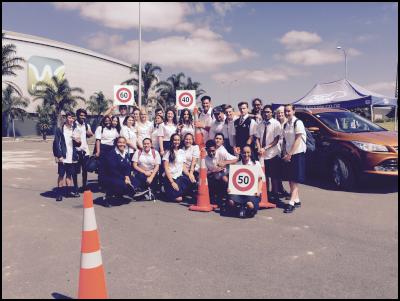Small increments in speed can have fatal consequences
Small increments in speed can have fatal consequences
Leading New Zealand youth road safety educator Road Safety Education Ltd (RSE), has supported comments by Associate Professor Sam Charlton, a driver behaviour specialist from Waikato University, that even a small shift in average speed has a big impact on fatality and crash rates.
Following the worst road toll in 27 years, over a horror long weekend on New Zealand roads when 11 people were killed, it has been suggested that the difference between travelling at 50kph and 55kph is negligible and drivers shouldn't be ticketed.
RSE rejects this suggestion, pointing out that it is in these speed zones where the unpredictable happens and drivers need to be even more vigilant. "These are the areas where a child will race onto the road chasing a ball or where a pedestrian will step mindlessly off a curb. Visibility can also be challenge with tree-lined streets, parked vehicles and garbage bins. The speed limits are set for a reason and every kilometre over the limit has a devastating impact", said RSE NZ Programme Manager, Maria Lovelock.
Associate Professor Charlton, who has been a member of the Traffic and Road Safety Research Group (TARS) for 20 years and is a member of RSE's Advisory Council, said "Often driver's are not sure what speed they are going, and they aren't really sure in urban areas what the speed limit is. That's a big issue".
RSE’s flagship programme RYDA, aimed at high school students aged between 16 and 18, is a series of practical and powerful workshops that aim to change the way young people think about road safety. The Programme tackles the issue of speed, with an emphasis on those small increments.
As part of an interactive one-day experience, students take part in a practical braking demonstration - seeing the time it takes to stop a car at different speeds and watching as a crash dummy takes the impact of small increment increases. At 55kph, a car will travel over 15 metres in one second. The impact on a pedestrian is huge.
The demonstrations also shows that by going over the speed limit, drivers:
• have less time to react to dangerous situations
• take longer to stop the vehicle
• are less able to observe warning signs
• strike objects with significantly greater force
• are more likely to die or receive severe injuries in the event of a crash
The large majority of novice driver crashes are caused by factors such as inexperience, immaturity, inaccurate hazards perception, overestimation of driving skills, and risk taking. It is not enough to teach a young person the skill of controlling and manoeuvring a vehicle. Before we hand over the keys, we must be sure that we've balanced those skills with the skills of critical thinking and an understanding and appreciation for safety on the road - both a drivers and highly influential passengers.
It can only be harmful to a young driver to suggest that there is such a thing as safe speeding.
To date 36,000 students have graduated from the RYDA programme across New Zealand since its introduction in 2007.
Students are asked to make a minimal contribution to the programme largely funded by NZ Steel, BOC Gases, BOSCH, the Alexander group and Community Partner, Rotary.

ENDS


 Yachting New Zealand: Project Arotake Update - Oversight Group Formed As Top Names Appointed To High-Performance Advisory, ALG
Yachting New Zealand: Project Arotake Update - Oversight Group Formed As Top Names Appointed To High-Performance Advisory, ALG Hospice NZ: Sustainable Funding For Hospices
Hospice NZ: Sustainable Funding For Hospices David Hill - LDR: Surge In Young Parents’ College Enrolments
David Hill - LDR: Surge In Young Parents’ College Enrolments NZEI Te Riu Roa: School Lunches - Give Schools Option To Use In-School And Community Providers Immediately, Union Says
NZEI Te Riu Roa: School Lunches - Give Schools Option To Use In-School And Community Providers Immediately, Union Says University of Auckland: Billion-dollar Business Lessons From Kiwi Entrepreneur
University of Auckland: Billion-dollar Business Lessons From Kiwi Entrepreneur NZ Veterinary Association: NZVA Celebrates Welcome Additional Support From Veterinary Nurses
NZ Veterinary Association: NZVA Celebrates Welcome Additional Support From Veterinary Nurses